The current global COVID-19 pandemic has resulted in the 23rd International AIDS Conference, 6-10 July 2020, going virtual.
Announcing AIDS 2020: Virtual: This year, AIDS 2020 will offer 24-hour access to breaking HIV science, highlighting the needs of populations left behind in the global HIV response, including transgender communities. In addition to the main conference, which requires registration, there is a Global Village that is open access to everyone. The Global Village will offer online networking zones and NGO booths, streaming of performances and films, and a host of virtual interactive sessions.
Trans Sessions at AIDS 2020: Virtual
On-Demand Trans Sessions
Transgender Men & HIV: Experiences and Vulnerabilities, why we should care, and where to go from here – GATE
Historically, trans men and assigned female at birth (AFAB) non-binary people have been excluded from the global HIV response. Up until today HIV research has broadly included trans women only. Trans men and AFAB non-binary people are expected to be exposed to higher risks, but little is known about the sexual health needs and vulnerabilities of this population. Trans people face barriers in accessing health care services. The experiences of discrimination and lack of knowledge of medical professionals about trans bodies and stereotypical assumptions lead to a neglect of appropriate care, prevention and treatment of HIV & STIs. Due to a dearth of research, a deficit of funding etc., little is known about HIV prevalence of this population. This session targets these structural barriers provides insight to actions that need to be taken in order to facilitate research, health care services and prevention inclusive of trans men and AFAB non-binary people.
Transgender Challenges Around the World – AIDS Healthcare Foundation
This is a panel discussion for the history books. Transgender Challenges Around the World has assembled trans warriors that have kept the struggle for change alive in a world that has not always recognized nor respected them. Trans advocates will get real about the struggles faced in accessing HIV care and services, exclusionary policies, the erasure of trans stories and how they continue to win no matter the surmounting odds. You will also get a sneak peek of “Born Human” an uplifting documentary on the challenges that transgender people face and overcome around the world. All of this moderated by the eccentric FLUX President, Queen Victoria Ortega.
Trans*forming care: Integrated services that work for trans people
The session will provide insights into the dynamics of healthcare utilization/access by transgender people. It will share experiences by transgender people, health workers and clinicians providing HIV services and highlight interactions with individuals and health systems that do not lead to the best health outcomes. It will as well look at the development of trans-specific healthcare beyond HIV and the empowerment processes in building community trust to help to get there.
Identity, expression and orientation: Gender-transformative approaches within the HIV response
The session will explore gender-affirming and gender-transformative approaches offering opportunities and tools to reach communities that are gender and sexually diverse in the global HIV response.
Born Human (Documentary) – AIDS Healthcare Foundation
Born Human is a candid documentary featuring transgender people globally and their inspirational experiences in pursuits of success, love and justice in an ambivalent society riddled with ignorance and fear that perpetuates threats of violence, high rates of HIV, poverty and unemployment. AIDS Healthcare Foundation has been supporting transgender issues globally for over ten years.
Scaling access to 2+1+1 PrEP: Early experiences in rolling out event-driven PrEP in lower- and middle-income countries – World Health Organization (WHO); PATH
What’s the 2+1+1? In July 2019, the World Health Organization updated its PrEP guidance to include the 4-pill (2+1+1) event-driven (ED)-PrEP dosing regimen for men who have sex with men (MSM). ED-PrEP is as equally efficacious as daily oral PrEP when taken correctly, and provides flexibility and choice to those who may not need a daily pill to protect themselves from HIV. ED-PrEP offers the additional advantage of clear guidance on when to start and stop PrEP, reduced cost to users, and lower drug exposure. This session will highlight first experiences in implementing ED-PrEP in early adopter lower- and middle-income countries, sharing key milestones, lessons learned, and challenges overcome. It will also feature a panel discussion on what can be done to further increase access to ED-PrEP among MSM from the perspectives of policy makers, scientists, advocates, and PrEP users themselves.
HIV and mobility: Migrant and mobile populations, climate change, homelessness, food and security
The session aims at highlighting the added burden in national HIV responses caused by mass migration and brainstorm on solution. It will showcase the experiences and challenges of migrant key populations and possible mitigation actions and improve understanding on the complexities of indigenous people facing migration, displacement and specific needs. It will then highlight the multiple challenges transgender migrants face in the United States.
PrEP for Transgender Communities: Lessons from 3 demonstration projects in California – California HIV/AIDS Research Program
The California HIV/AIDS Research Program funded three demonstration projects focused on increasing access, uptake, and adherence to PrEP among transgender individuals in California. These were the first PrEP demonstration projects in the U.S. focused specifically on transgender communities. The 3 research teams, two from the San Francisco Bay Area and one from San Diego/Los Angeles, aimed to provide PrEP to a combined 700 transgender and non-binary individuals, with particular focus on transgender women of color. PrEP provision was included as part of a comprehensive prevention and sexual health package. Gilead Sciences provided the Truvada? for the studies. The session will feature presentations from each of the research projects and highlight the various models of PrEP delivery used, facilitators and barriers to PrEP uptake and adherence, early findings from pharmacokinetic studies on PrEP and hormone interactions, and other key lessons learned throughout the different studies.
Moving forward PrEP programming for MSM and Transgender Women in Latin America: lessons learned from the ImPrEP Project – Evandro Chagas National Institute of Infectious Diseases/Fiocruz; Brazil
The symposium builds on the experience of the UNITAID-funded PrEP implementation project (ImPrEP) in Brazil, Mexico and Peru and south-south cooperation among Latin American countries, to examine the current access to PrEP for Men who have Sex with Men and Trans Women in Latin America (LA), highlighting successful approaches, enabling factors and challenges related to PrEP programming and scale up in the context of combination prevention strategies. It presents an overview of current access to PrEP in LA, emphasizing policy uptake and implementation experiences in public and community-based health services; debates community-driven demand creation, awareness and advocacy for PrEP; analyzes successful approaches to implement PrEP services within national HIV prevention strategies through the description of country case studies; and showcase the experience of the ImPrEP project in pioneering access to PrEP in LA, enhancing community-engagement, and fostering south-south collaboration.
Gaps in our response: Who are we missing?
- Introduction & Conclusion – Cecilia Chung, Transgender Law Center
- Food insecurity highly prevalent and associated with early PrEP non-adherence among trans and non-binary people in the San Francisco Bay Area: The STAY Study – Albert Liu, San Francisco Department of Public Health
Breaking the cycle: from aid to sustainable development
- Key populations doing it for themselves: The rise of social enterprise approaches to increase financial sustainability of the community-based HIV response – Yen Vu, PATH
From faith to MTV: Expanding the reach of HIV services
- Implementation of the ”First Friendly Practice for Trans-Female People” at Arzobispo Loayza National Hospital. A public-private partnership, Lima, Peru 2019 – Maribel Muñoz, AIDS Healthcare Foundation
I Test, You Test, We All Test: Multiple Roads to the First 90
- HIV self-tests free distribution in Brazil: An effective strategy for reaching undiagnosed key populations – Mariana Villares, Brazilian Ministry of Health
- TRUST: Results of an HIV self-testing intervention for Black or African-American transgender women (TGW) and gay, bisexual and other men who have sex with men (MSM) in New York City – Victoria Frye, CUNY School of Medicine
- What’s a lab got to do with it? Alliances with private laboratories enhance HIV-case finding among at-risk MSM and transgender women in Central America – Alejandra Cabrera, Population Services International
Emerging success stories in PrEP in MSM and TGW in Asia
- High PrEP adherence in men who have sex with men and transgender women cohort in Manila, Philippines: Evidence of HIV protective levels from tenofovir blood concentrations in project PrEPPY – Glenn-Milo Santos, University of California San Francisco
Sexual concurrency and sexual networks
- Leveraging social networks and technology for HIV prevention and treatment with transgender women – Ian W. Holloway, University of California, Los Angeles
- Longitudinal associations between place of sex work, depression and HIV vulnerabilities among sex workers in Baltimore, Maryland: A social geography of sex work approach to guide HIV prevention cascade optimization – Carmen Logie, Factor-Inwentash Faculty of Social Work, University of Toronto
- Creating communities of emergency responders to reduce violence against sex workers and increase access to justice and HIV services: Lessons learned from the Hands Off programme – Soraya Bouwmeester, Aidsfonds
HIV and mobility: Migrant and mobile populations, climate change, homelessness, food and security
- Migration and key populations: Challenges in the process – Dinah de Riquet-Bons, European BPOC- Migrants trans Network Trans United Europe
Where did our voices go? HIV advocacy in a noisy landscape
- Advocacy in the LGBT communities in African countries – Kasha Jacqueline Nabagesera, Kuchu Times
- HIV advocacy and the black transgender community in the United States – Carmarion Anderson, Human Rights Campaign
It’s a man’s world: Are women losing out when it comes to biomedical HIV prevention?
- Transgender women and fears of PrEP – Rena Janamnuaysook, Thai Red Cross
The Global Village and Youth Programme
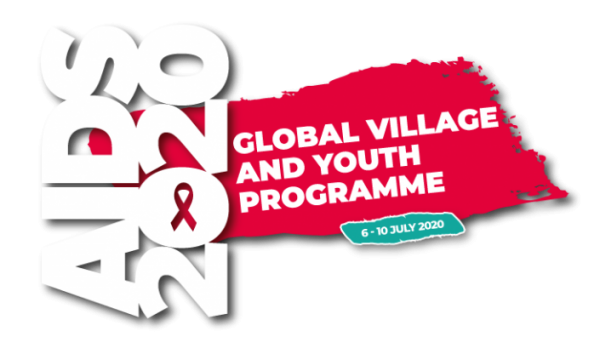
The virtual Global Village is free and open for anyone to attend. It intersects with the main virtual conference programme, featuring 220 activities from live workshops to on-demand sessions, cultural performances, networking zones, NGO booths, and art exhibits.
Access the Global Village! | Global Village and Youth Programme
The Global Village is a diverse and vibrant space where communities from all over the world gather virtually to connect, share and learn from each other. The free virtual Global Village is open to members of the public, as well as conference delegates, intersecting with the main virtual conference programme, featuring 220 activities from live workshops to on-demand sessions, cultural performances, networking zones, NGO booths, and art exhibits.
Here, communities can demonstrate the application of science and good leadership, and conference participants are invited to see how science translates into community action and intervention.
AIDS 2020: Virtual will enable delegates to access and engage with the latest HIV science, advocacy and knowledge traditionally presented at the conference, while offering a range of new features made possible by the new virtual format.
Experience 24-hour access to breaking science, showcasing the latest developments in HIV research. The conference provides an innovative and interactive global platform to influence discussions on HIV science, research and policy bringing together delegates from around the world, connecting virtually to advance the HIV response.
Trans Networking Zone: ‘Thriving in our Diversity!’
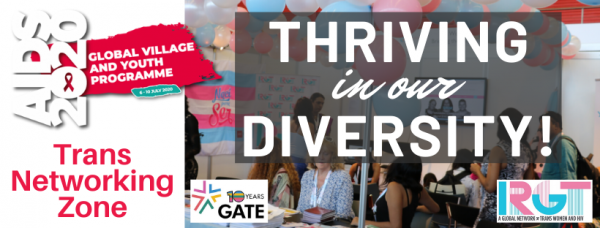
Thriving in our Diversity! is a Trans Networking Zone for trans people, funders and allies, organised by Global Action for Trans* Equality (GATE) and A Global Network of Trans Women and HIV (IRGT), in collaboration with Social Health and Empowerment Feminist Collective of Transgender Women Of Africa (S.H.E.), Red Trans Peru, Solidarity and Action Against The HIV Infection in India (SAATHII), Positively Trans, CliniQ, Transgender Europe (TGEU), the International Working Group of Trans Men and HIV and United Caribbean Trans Network (UCTRANS).
Visit the Trans Networking Zone! NOTE: To use the above link, you need to be logged into the Global Village. Access the Global Village.
Thriving in our Diversity! includes programming content from trans activists across the globe, as well as resources from IRGT, GATE and the Trans Men and HIV Working Group.
The main objective is to provide a safe space for trans activists, trans people living with HIV, donors and allies to discuss Universal Health Coverage, SDGs, research, prevention, care, treatment and support for trans people worldwide.
We aim to provide a collaborative and learning exchange space with opportunity to network, share and exchange ideas and best practices, experiences, south-south learning and to strengthen the global trans HIV response.
LIVE CHAT DAILY – 6-10 July
Mon 6 July: 4-5 pm | 8-10 pm Tue 7 July: 10-11 am | 4-5 pm | 7-8 pmWed 8 July: 4-5 pm | 7-9 pmThu 9 July: 10-11 am | 3-5 pmFri 10 July: 10-11 am | 4-5 pm
Daily Hosts
Mon 6 July: GATE Tue 7 July: IRGT Wed 8 July: Trans Men and HIV WGThu 9 July: IRGT Fri 10 July: GATE
Programming & Resources:
- Downloadable resources from GATE and IRGT on trans people and HIV and funding trans movements;
- Educational information on trans people and HIV, trans healthcare and wellbeing, and global trans movements; and
- Entertainment including trans performances, trans documentaries and shorts films, and vegan cooking!
NGO Booth: ‘Global Action for Trans* Equality (GATE)’
In GATE’s NGO Booth you can learn about our work, meet our staff and access materials and publications. There will be downloadable resources about GATE’s program areas and projects available.
The main objective is to provide information to donors, potential partners and other professionals at AIDS 2020: Virtual who would like to find out more about GATE’s work and/or collaborate with us on our projects.
Visit our NGO Booth! NOTE: To use the link, you need to be logged into the Global Village. Access the Global Village.
LIVE CHAT DAILY: 6-10 July
All times displayed in CEST
Mon 6 July: 9-10 am | 6-8 pm Tue 7 July: 9-10 am | 2-4 pm | 8-10 pmWed 8 July: 8-10 am | 1-3 pmThu 9 July: 9-10 am | 1-3 pm | 7-10 pmFri 10 July: 9-10 am | 1-3 pm
Why Attend AIDS 2020: Virtual?
AIDS 2020: Virtual will enable delegates to access and engage with the latest HIV science, advocacy and knowledge traditionally presented at the conference, while offering a range of new features made possible by the new virtual format.
To encourage the broadest participation possible in the conference, AIDS 2020 organizers are offering a four-tiered fee structure with lower registration fees for delegates from upper-middle income countries, lower-middle income countries and low-income countries (based on the World Bank Classification), and students/youth/post-docs. Media registration is free for qualified individuals who are attending as journalists, photographers, videographers and community educators.
Pre-Conference Programme
Hosted online from Tuesday, 30 June to Friday, 3 July these independently organized meetings offer a wide range of population- and issue-specific programming within the field of global health and development. All AIDS 2020: Virtual delegates can attend pre-conferences, as well as those with pre-conference passes.
Conference Programme
Experience 24-hour access to breaking science, showcasing the latest developments in HIV research. The conference provides an innovative and interactive global platform to influence discussions on HIV science, research and policy bringing together delegates from around the world, connecting virtually to advance the HIV response.
Programme At A Glance | Online Programme
Prime Session and Plenary Line-Up
The AIDS 2020: Virtual plenary sessions feature some of the world’s most distinguished HIV scientists, policy specialists and community leaders. Each day, four Prime Sessions will be released across multiple time zones featuring plenary presentations, special sessions and live Q&A with world-class scientists and speakers. Once published, the session recordings will be available exclusively for delegates on-demand in the conference platform.
Join the Resilience Campaign
The theme of this year’s conference is Resilience, echoing the ability of the HIV community to come together in a shared commitment to the global HIV response.
AIDS 2020 invites you to share your stories of resilience and to join thousands of others across the world, uniting as one through our shared Resilience.
Film your own Profile in Resilience or Share your story of #Resilience on social media.
When sharing your story, use #AIDS2020Resilience
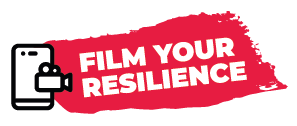
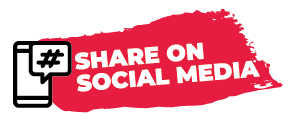
Profiles in Resilience
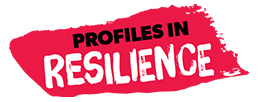
Profiles in Resilience is a project celebrating the extraordinary work that individuals and communities are doing to advance the HIV response.
HIV activists were paired with local visual artists to create diverse works of art. Each month leading up to the AIDS 2020 Conference, a new Profile will appear in the online gallery and on the AIDS 2020 social channels. Each month, a Profile will be exploring key aspects of resilience – resilience in science, resilience in policy, resilience in financing, resilient communities, and resilient individuals.
Pushing Through, Pushing Forward
GATE’s Director of Communications, Erika Castellanos, was paired with artist Liam O’Donnell (@odoillustration), an illustrator and designer from Oakland and now based in Brooklyn, New York.
For me, resilience is not only being strong, but also surviving in your moments of weakness. I don’t always have to be strong. I also need to cry. I also ned to feel frustrated. I also need to feel anger. Resilience to me is overcoming these moments. So I cry then I wipe away my tears and go on. I get angry, I scream, I take out my frustration and go on. For me that’s resilience.
Erika Castellanos





